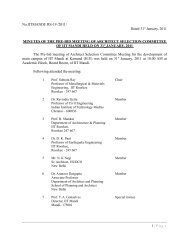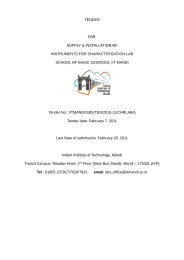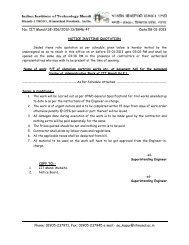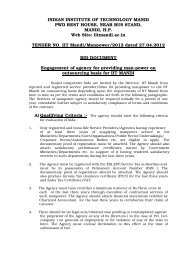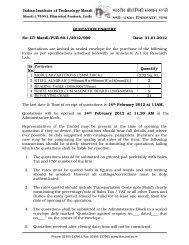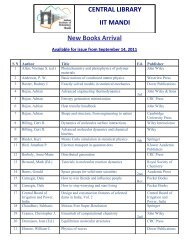Issue1. Vol.1 (April, 2013) - IIT Mandi
Issue1. Vol.1 (April, 2013) - IIT Mandi
Issue1. Vol.1 (April, 2013) - IIT Mandi
- No tags were found...
You also want an ePaper? Increase the reach of your titles
YUMPU automatically turns print PDFs into web optimized ePapers that Google loves.
ESSENT Society for Collaborative Research and Innovation, <strong>IIT</strong> <strong>Mandi</strong>5 Cultivating InnovationThe first step towards having innovative ideasis to fill your brain with as many facts aspossible. To this end, read widely within yourdiscipline and interests and even outside these.Apart from the courses in your discipline, takesome courses that are quite unrelated to yourfuture profession. You never know when thesewill become useful, perhaps many years downthe road. Academic institutions give you theopportunity to attend seminars on a variety oftopics. Again, make it a point to attendseemingly “irrelevant” seminars. Whilereading and attending seminars, think aboutwhat you read and hear, make notes on whatyou have learnt. This effort “cements” thefacts into your neurons, triggers neurons to fireand helps result in useful new ideas.Last but not least, exploit the power ofnetworking. Develop a network of thoughtful,intelligent people with whom you can interactin person, by email, by social networking.Some of these may be in your current coreinterest area, many should be in diverse fields.Bounce your ideas off them, listen andcomment on their ideas however fanciful andunrelated to your core interests. Millerdescribes innovation conversations as animportant part of the innovation process[Miller 07].6 The Final WordIndia is a country with vast problems, arguablythe most fertile place in the world for abudding young engineer or scientist lookingfor challenges. Innovation is the key to thewell-being for all India's citizenry throughequitable, sustainable growth. Innovation canbe cultivated by any bright young engineer.While solving key problems of the nation, youwill achieve immense self-satisfaction,probably great financial rewards and possiblywidespread fame. The exhortation of John F.Kennedy “Ask not what your country can dofor you, ask what you can do for your country”is not a call to sacrifice and suffering, but aninvitation to a rich professional career!Acknowledgements: Comments from AshokJhunjhunwala, Priscilla Gonsalves, YvonneDittrich and Anand Srivastava have helped togreatly improve the contents and presentationof this article.References1) [Chao 06] Linda Chao, "Licensing toCompanies in Asia: The Stanford Model",Oct-2006http://asia.stanford.edu/events/fall06/slides/061026-chao.pdf.2) [Gould 82] Stephen J. Gould & ElisabethS. Vrba, “Exaptation – A Missing Term inthe Science of Form”, Paleobiology 8, Jan.1982, pp. 4-15.3) [Johnson 10] Steven Johnson, WhereGood Ideas Come From: the naturalhistory of innovation, Penguin, 2010.4) [Jhun 11] Ashok Jhunjhunwala, Personalcommunication, Apr. 2011.5) [Miller 07] William C. Miller, TheInnovation Process, IEEE-USA eBook,2007.6) [Munshi 09] Porus Munshi, MakingBreakthrough Innovation Happen: How11 Indians Pulled off the Impossible,HarperCollins, 2009.7) [Wiki 12] “Tim Berners-Lee”,https://en.wikipedia.org/wiki/Tim_berners-lee, visited 13/10/12.8) [WorldBank 12] “World Bank Indicators -- India -- Income distribution – 2012”,http://data.worldbank.org/indicator/SI.DST.05TH.20/countries.10 ESSENT|Issue1|Vol1




